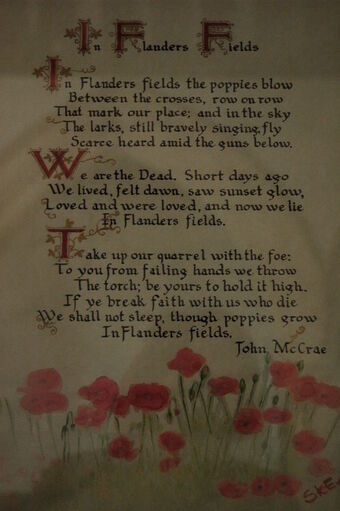
"In Flanders Fields," perhaps the most famous rondeau; Hasfield Church, Gloucester, UK. Courtesy Geograph.org.
The Rondeau (plural, Rondeaux) is a form of verse that, like many English language verse forms, is of French origin.
Form[]
The rondeau, like much of traditional French poetry, makes use of refrains, repeated according to a certain stylized pattern. It was regarded as a challenge to arrange for these refrains to contribute to the meaning of the poem in as succinct and poignant a manner as possible.
The rondeau consists of 13 lines of iambic tetrameter or pentameter, employing, altogether, only 2 rhymes; plus 2 refrains(which are half lines, each of 2 feet).
It has 3 stanzas with a rhyme scheme of
- S1: A A B B A
- S2: A A B refrain
- S3 A A B B A refrain:
The refrain must also be used as the opening 4 syllables of the poem.
Example[]
Here is an example of a Rondeau. Note how, in this case, the refrain is used to emphasize the immediate contact message of the poem:
- Gold is the Gleam
- Gold is the gleam that lures men on,
- To desperate deeds, right and wrong.
- Gold is the chance men deem to take,
- To gamble on a make or break,
- Before the tempting hour is gone.
- Fortunes can be both lost and won,
- The vast gold-searching throng among
- And what is said - if e'er they spake?
- "Gold is the gleam!"
- Bright gold most men might seek, or one,
- Gild twice ten thousand palms or none.
- Before you go your claim to stake,
- There's a precaution you should take,
- For you may find where there's a con -
- Gold is the gleam.
Famous Rondeaux[]
The most famous rondeau in English is undoubtedly "In Flanders Fields", written by Canadian poet John McCrae (see above).
Another example is We Wear the Mask by Paul Laurence Dunbar:
- We wear the mask that grins and lies, (A)
- It hides our cheeks and shades our eyes,— (A)
- This debt we pay to human guile; (B)
- With torn and bleeding hearts we smile, (B)
- And mouth with myriad subtleties. (A)
- Why should the world be over-wise, (A)
- In counting all our tears and sighs? (A)
- Nay, let them only see us, while (B)
- We wear the mask. (C)
- We smile, but, O great Christ, our cries (A)
- To thee from tortured souls arise. (A)
- We sing, but oh the clay is vile (B)
- Beneath our feet, and long the mile; (B)
- But let the world dream otherwise, (A)
- We wear the mask! (C)
Rondeau redoublé[]
A more complex form is the rondeau redoublé. This is also written on two rhymes, but in five stanzas of four lines each and one of five lines. Each of the first four lines (stanza 1) get individually repeated in turn once by becoming successively the respective fourth lines of stanzas 2, 3, 4, & 5; and the first part of the first line is repeated as a short fifth line to conclude the sixth stanza. This can be represented as - A1,B1,A2,B2 - b,a,b,A1 - a,b,a,B1 - b,a,b,A2 - a,b,a,B2 - b,a,b,a,(A1).
The following example of the form was written from the point of view of one of the RAF officers carrying the coffin of Diana, Princess of Wales to the plane that was to carry it to England.
- Guard of Honour by Paul Hansford
- The burden I bear is more heavy than lead.
- The physical weight is a thing that I share,
- but the loss that I feel will not leave my head.
- Why did you have to die? Why is death so unfair?
- I am close to you now. Yes, touching my hair
- the flag with its lions of gold and of red
- that wraps round your coffin. I know you are there.
- The burden I bear is more heavy than lead.
- My comrades move with me in slow, solemn tread.
- Our eyes are all fixed in an unseeing stare.
- Our shoulders support you in your oaken bed.
- The physical weight is a thing that I share.
- As I feel the world watching I try not to care.
- My deepest emotions are best left unsaid.
- Let others show grief like a garment they wear,
- but the loss that I feel will not leave my head.
- The flowers they leave like a carpet are spread,
- In the books of remembrance they have written, "Somewhere
- a star is extinguished because you are dead.
- Why did you have to die? Why is death so unfair?"
- The tears that we weep will soon grow more rare,
- the rawness of grief turn to memory instead.
- But deep in our hearts you will always be there,
- and I ask, will I ever be able to shed
- the burden I bear?
See also[]
- Rondel
- Roundel
Analogous musical forms:
- Rondo
- Rondeau (music) -- Medieval and Renaissance form
External links[]
- Examples
- Examples of rondeaux on Penny's Poetry Blog
- Four early-21st-century rondeaux in English by Suzanne Honour
- About
| This page uses Creative Commons Licensed content from Wikipedia. (view article). (view authors). |